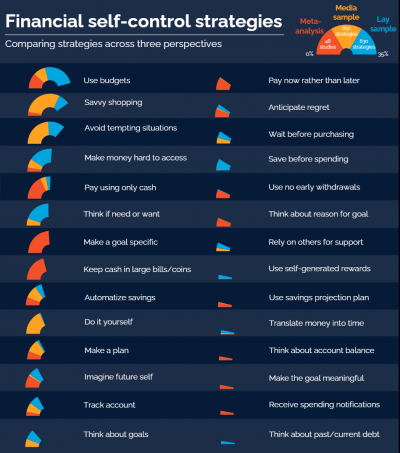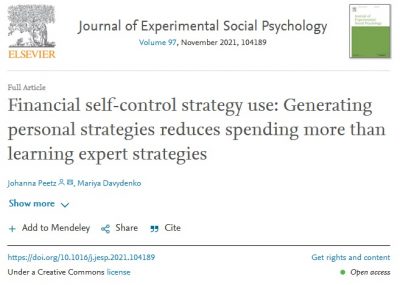Personal Spending
Financial decisions are a common feature of daily life – we have to decide whether we want to budget more or less for a hobby or night out or even a grocery trip. Financial self-control – following up on goals to save money and spending it judiciously – is hard and people frequently fall short on their intentions. For example, only 22.9% of Canadians contribute to a Registered Retirement Savings Plan (Statistics Canada, 2017) even though most agree that saving for the future is an important goal. As part of a SSHRC funded research programme, the lab studies daily financial decisions and to identify tools that help people bring their spending in line with their goals.
You can also check out “Financial Matters“, a Psychology Today Blog summarizing some of our research or watch Johanna Peetz’ podcast with Rational Reminder!
Financial self-control strategies
One research project, spearheaded by Mariya Davydenko, set out to collate the cognitive and behavioural strategies known to behavioural scientists that can help financial self-control. In a meta-analysis, we collated the most common financial self-control strategies mentioned in the academic literature, in a sample of media articles, and mentioned by a sample of 1000 participants. Here is a summary of the most common strategies:

Watch a 2 min video on some financial self-control strategies YOU can use to help you spend less!
Or read this open access article on which strategies were most effective in reducing monthly spending:
Other research on Financial Decisions and Personal Spending from our lab
Davydenko, M. & Peetz, J. (in press) Does timing of self-control strategies matter? How focusing on proactive versus reactive strategies affect monthly spending. Basic and Applied Psychology.
Gennara, A., Peetz, J., & Milyavskaya, M. (2023). When more is less: Self-control strategies are seen as less indicative of self-control than just willpower. Journal of Experimental Social Psychology, 106, 104457.
Peetz, J., & Davydenko, M. (2022). Financial Self-regulation. Social and Personality Psychology Compass. http://doi.org/10.1111/spc3.12663
Peetz, J., & Davydenko, M. (2021). Financial self-control strategy use: Reminders of personal strategies (but not expert strategies) reduce spending. Journal of Experimental Social Psychology.
Davydenko, M., Kolbuszewska, M., & Peetz, J. (2021). Financial self-control strategies: A meta-analysis, media analysis, and lay person perspective on strategies to curb spending and promote saving. PLosOne.
Peetz, J., Robson, J., & Xuereb, S. (2021). The role of income volatility and perceived locus of control in financial planning decisions. Frontiers in Psychology, 12, 1818. https://doi.org/10.3389/fpsyg.2021.638043
Peetz, J., Davydenko, M., & Wohl, M. J. A. (2021). The cost of self-forgiveness: Incremental theorists spend more money after forgiving the self for past overspending. Personality and Individual Differences, 179, 110902
Robson, J., & Peetz, J. (2020). Gender differences in financial knowledge, attitudes, and behaviors: Accounting for socioeconomic disparities and psychological traits. Journal of Consumer Affairs, 54(3), 813-835.
Davydenko, M., & Peetz, J. (2020). Shopping less with shopping lists: Planning individual expenses ahead of time affects purchasing behavior when online grocery shopping. Journal of Consumer Behaviour, 19(3), 240-251.
Soliman, M., Buehler, R., & Peetz, J. (2017). Envisioning a future purchase: The effects of consumption imagery perspective and identity on consumer motivation. Psychology and Marketing, 34(7), 684-692.
Peetz, J. & Soliman, M. (2016). Big money: The effect of money size on value perceptions and saving motivation. Perception, 45(6), 631-641.
Peetz, J., Simmons, M., Chen, J., & Buehler, R. (2016). Predictions on the go: Prevalence of spontaneous spending predictions. Journal of Judgment and Decision Making, 11 (1), 48-61.
Peetz, J., Buehler, R., Koehler, D. & Moher, E. (2015). Bigger not better: Unpacking future expenses inflates spending predictions. Basic and Applied Social Psychology, 37, 19-30.
Peetz, J., & Buehler, R. (2013). Different goals, different predictions: Accuracy and bias in financial planning for events and time periods. Journal of Applied Social Psychology, 43, 1079-1088.
Peetz, J., & Buehler, R. (2012). When distance pays off: The role of construal level in spending predictions. Journal of Experimental Social Psychology, 48, 395-398.
Peetz, J., & Buehler, R. (2009). Is there a budget fallacy? The role of savings goals in the prediction of personal spending. Personality and Social Psychology Bulletin, 35, 1579-1591.


